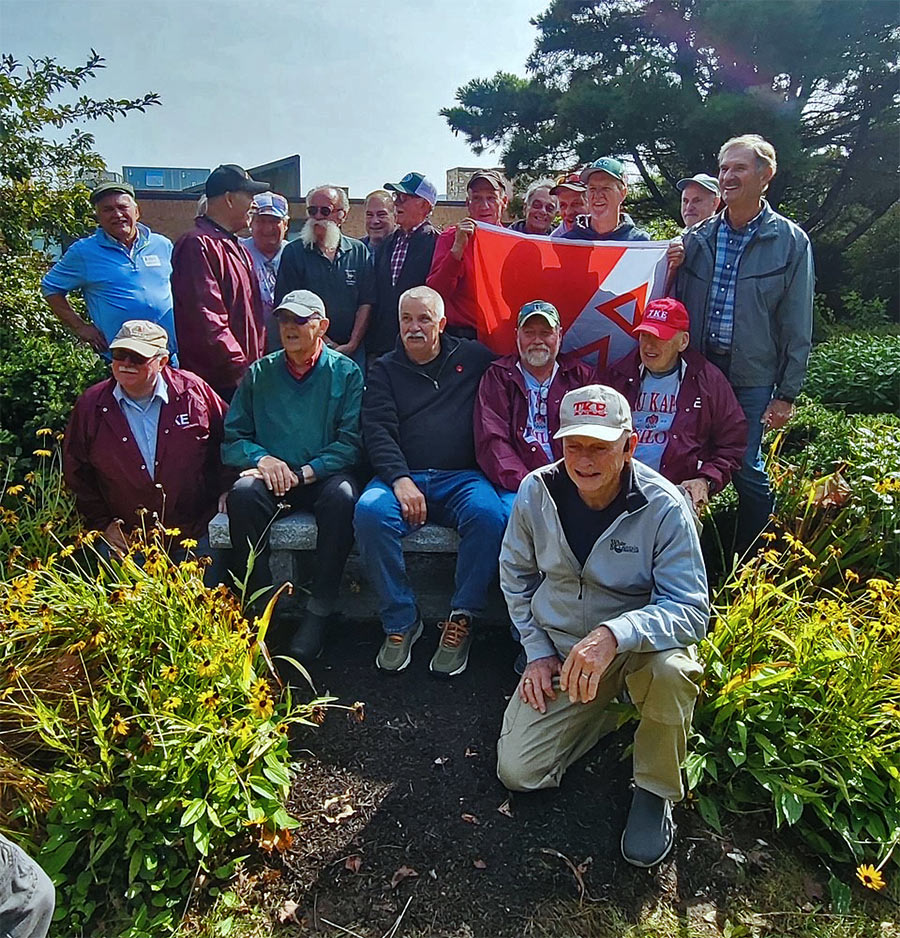A granite bench honors the legacy of The Phi Mu Kappa/Tau Kappa Epsilon Fraternity and has raised funds toward the R. Stephen Eastman Scholarship. Located on University Way, facing the Samuel Read Hall Building (formally Hall dormitory), it is engraved with the fraternity crests and dates of existence as well as the lyric, “He ain’t heavy he’s my brother,” a song emphasizing PMK/TKE’s bonds of brotherhood.
With the purchase of the first and only off-campus fraternity house in 1968, Phi Mu Kappa joined a national fraternity, Tau Kappa Epsilon, and became known as The Lambda Rho Chapter of TKE. During its nearly 25 years of existence, over 250 members bore witness to a very special moment in time.

Student life was in many ways a draconian existence. The stipulations of nightly curfews and permission to leave campus for female students made social interaction a hurdle, and inter-visitation did not burst onto the scene until 1972. Women and men ate at different times and coed dining was only allowed on Sundays.
Dorms with common rooms had televisions that received just one station and there was one pay phone per dorm. Students relied heavily on taking notes on index cards and papers had to be typed.
The main dormitories were arranged in a kind of triangle, with Blair and Hall dorms for men and Mary Lyon for women. During warmer months students would open windows at night and literally shout across to one another, giving rise to chants and insults that can’t be repeated here. Students also coded messages into song requests during evening dedication broadcasts on the college radio station.
These conditions created a desire for more social freedom, unity, and camaraderie, along with better ways to share information. Luckily for me, in 1963 a group of male students had formed a Greek fraternity, modeled on those found elsewhere, of which I later became a member.
The Phi Mu Kappa became a social mecca and by 1968 had outgrown their rented house. At the same time, discussions were being held to merge with the national fraternity Tau Kappa Epsilon. In 1969, the new Lambda Rho Chapter of Tau Kappa Epsilon (TKE) became the first and only fraternity on campus to own its own house, on 34-36 Russell Street.
The fraternity was key to the formation of campus athletics, including football and hockey clubs that later became Division III teams, as well as activities like Homecoming and student governance. Brothers also became active in nationwide social concerns.
TKE was the college’s first and only totally independent Greek organization. By the end of 1982 it had been joined by fraternities Kappa Delta Phi, Lambda Chi, Alpha Chi, Omega Omicron, Theta Alpha Tau, Alpha Theta, and sororities Tau Omega, Iota Delta Chi, Kappa Sigma Phi, Delta Zeta, and Chi Alpha Zeta. They gave rise to student leaders, some who are still active at PSU today, and their charitable and philanthropic efforts influenced the great work of today’s Greek organizations.
Plymouth’s first Greek era was an era of rapid changes, from the music scene, technological advances, and the beginning of social media. What stayed consistent was the camaraderie that Greek life brought to so many and the strong bonds that remain today.
It was a moment in time, but oh what a moment that I will always hold dear. ■ William Hunter Weidmann ’73
Editor’s note: This is an abbreviated version of the full article. To read the article in full and learn more about the PMK/TKE history and the R. Stephen Eastman scholarship, click here.